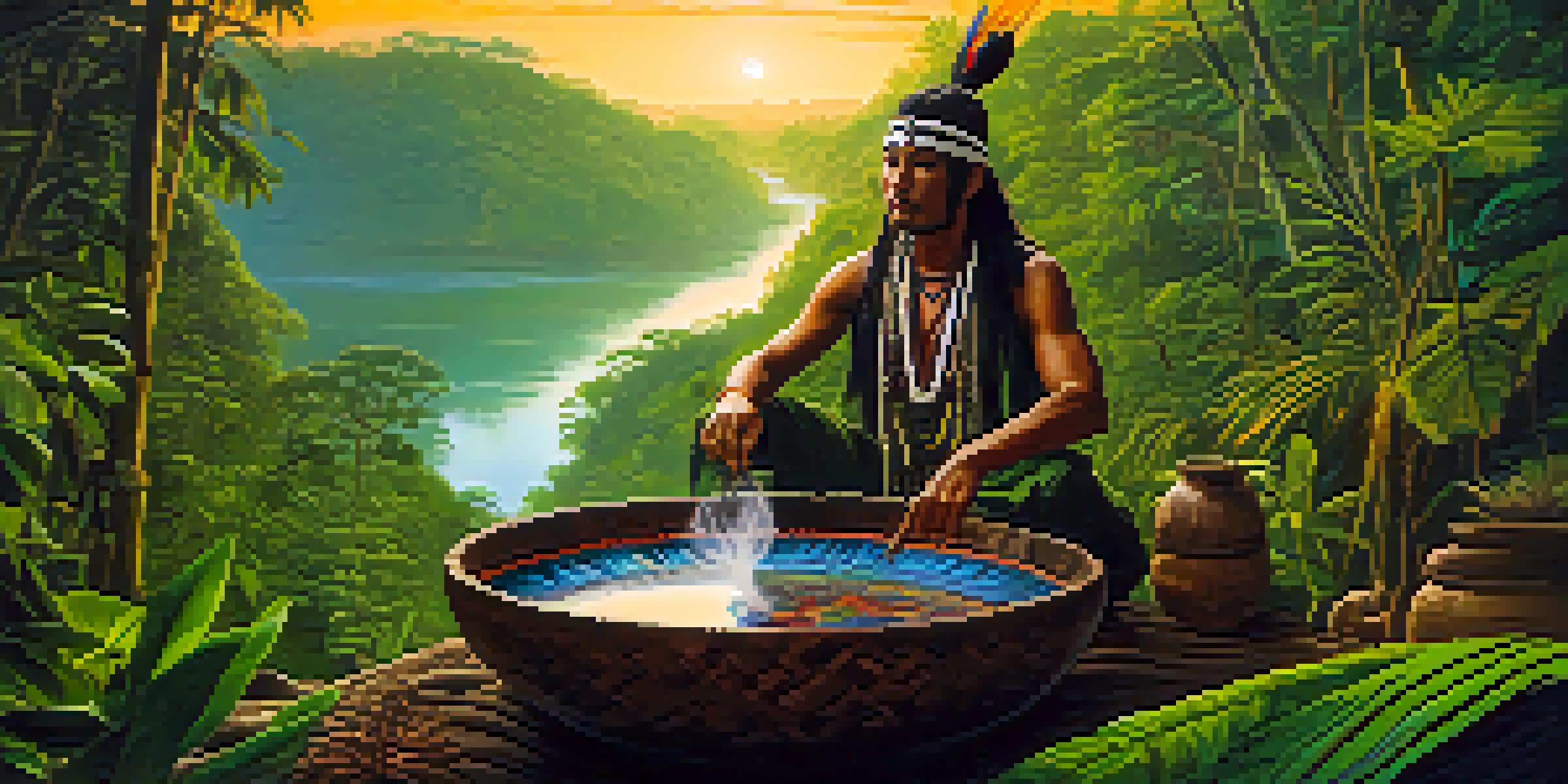Cultural Narratives: Ayahuasca and Identity in Indigenous Practices

Understanding Ayahuasca: More Than a Hallucinogen
Ayahuasca is a powerful plant-based brew originating from the Amazon. Used traditionally in Indigenous cultures, it is often consumed during spiritual ceremonies. This experience goes beyond mere intoxication; it serves as a conduit for profound personal and communal insights.
The experience of Ayahuasca is not just about the hallucinatory effects; it's about the revelations and healing that can occur within a community context.
The brew combines two plants: the Banisteriopsis caapi vine and the Psychotria viridis leaf. Together, they create a psychoactive experience that many describe as a journey into their own consciousness. This journey can reveal hidden truths about oneself and one’s place within the community, making it a vital aspect of identity formation.
In Indigenous practices, Ayahuasca ceremonies are led by experienced shamans who guide participants through their experiences. This guidance is crucial, as it helps individuals interpret the visions and emotions they encounter, reinforcing the cultural and spiritual significance of the journey.
The Role of Ayahuasca in Indigenous Identity
For many Indigenous communities, Ayahuasca is intertwined with their cultural identity and heritage. The rituals surrounding its use are passed down through generations, reflecting a deep connection to ancestral knowledge. This connection fosters a sense of belonging and continuity among community members.

Through these ceremonies, participants often confront personal and collective traumas, creating a space for healing. This process not only strengthens individual identities but also reinforces communal bonds, as shared experiences can unify people in their struggles and triumphs.
Ayahuasca's Role in Healing
Ayahuasca ceremonies facilitate personal and collective healing through introspection and shared experiences.
Moreover, the narratives that emerge from Ayahuasca experiences often inform cultural stories and teachings. These narratives contribute to a broader understanding of Indigenous worldviews, emphasizing the importance of nature, spirituality, and interconnectedness in shaping identity.
Ayahuasca as a Tool for Cultural Preservation
In an age of globalization, many Indigenous cultures face the risk of losing their traditions. Ayahuasca serves as a vital tool in cultural preservation, helping communities maintain their practices and beliefs. By engaging with this sacred plant, they affirm their identities in a rapidly changing world.
Cultural identity is rooted in the stories we tell, and Ayahuasca helps us to connect with those narratives and the collective healing they offer.
The ceremonies not only preserve ancient practices but also adapt them to contemporary issues. For instance, modern participants often include discussions about environmental challenges, thereby linking traditional knowledge with current global crises. This adaptability ensures that Indigenous narratives remain relevant.
Furthermore, the increasing interest in Ayahuasca among outsiders has prompted Indigenous groups to take control of their narratives. They are now actively participating in discussions about the meaning and significance of their practices, ensuring that their voices are heard and respected.
Challenges Faced by Indigenous Communities
Despite the resilience of Indigenous cultures, the commercialization of Ayahuasca poses significant challenges. As demand grows, some practitioners exploit the brew for profit, often overlooking its cultural significance. This commodification can dilute the authentic experiences that are central to Indigenous identity.
Moreover, outsiders seeking Ayahuasca experiences might not fully grasp the cultural context or ethical considerations involved. This can lead to misunderstandings and misrepresentations of Indigenous practices, further complicating the narrative surrounding Ayahuasca.
Cultural Preservation Through Ayahuasca
The use of Ayahuasca helps Indigenous communities maintain their cultural practices while adapting to contemporary issues.
Indigenous communities are now advocating for greater respect and recognition of their practices. They emphasize the importance of understanding the spiritual and cultural dimensions of Ayahuasca, not just its psychoactive properties, urging outsiders to approach their traditions with sensitivity and respect.
The Personal Journey: Individual Narratives and Healing
Each Ayahuasca ceremony is unique, often resulting in deeply personal narratives. Participants frequently share transformative stories that illustrate their journeys of self-discovery and healing. These individual experiences contribute to a collective understanding of the brew's power.
For many, Ayahuasca acts as a mirror reflecting inner struggles and aspirations. Participants often emerge with renewed perspectives on their lives, relationships, and identities. This transformative aspect not only impacts the individual but also resonates within their communities, fostering dialogues about personal and collective healing.
By sharing their stories, individuals help demystify Ayahuasca and highlight its significance beyond the ritual. These narratives can inspire others, encouraging them to explore their own identities and healing journeys, reinforcing the interconnectedness of personal and cultural narratives.
Ayahuasca and the Future of Indigenous Identity
As interest in Ayahuasca continues to grow globally, it presents both opportunities and challenges for Indigenous communities. The potential for cultural exchange can enrich understanding, but it must be approached with caution. Indigenous voices must lead the conversation to ensure their practices are respected and valued.
Looking forward, the integration of technology and media can play a role in preserving and sharing Indigenous narratives. Documentaries, podcasts, and social media platforms can amplify these voices, creating a bridge between cultures while highlighting the importance of respect and authenticity.
Challenges of Commercialization
The growing commercialization of Ayahuasca poses risks to its cultural significance and the authenticity of Indigenous practices.
Ultimately, the future of Indigenous identity in the context of Ayahuasca lies in balance. By honoring traditions while embracing modernity, communities can navigate the complexities of contemporary life, ensuring their narratives endure for generations to come.
Conclusion: The Significance of Cultural Narratives
Cultural narratives surrounding Ayahuasca highlight the intricate relationship between identity and Indigenous practices. These stories are not just about a plant; they encapsulate the values, beliefs, and histories of communities. Understanding this context enriches our appreciation of the cultural significance of Ayahuasca.
As we engage with these narratives, it’s essential to approach them with respect and openness. By doing so, we not only honor Indigenous cultures but also enrich our own understanding of identity, spirituality, and healing in a rapidly evolving world.

In essence, Ayahuasca serves as a powerful reminder of the resilience of Indigenous narratives. By listening to and learning from these stories, we can foster a deeper connection to the diverse tapestry of human experience and the myriad ways we seek understanding and belonging.